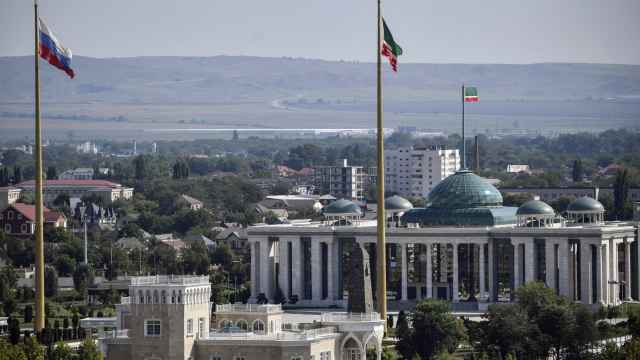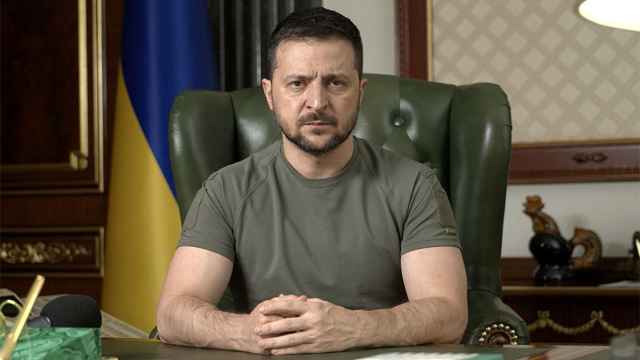The State Duma election television campaign kicked off Nov. 5 by intruding on the usual morning programming.
In nonelection times, the programming follows a standard pattern. Every 30 minutes, a five-minute news block airs. Since President Dmitry Medvedev and Prime Minister Vladimir Putin are the main sources of good news, morning viewers can expect a full chronicle of all the world’s bad news from the previous night: fatal car, airplane and train crashes, contract killings, floods, earthquakes, fires, clashes between protesters and police and other horrors to help them start their day.
Following the news, smiling talk-show hosts provide a wealth of useful information, such as how to overcome an attacker, robber or rapist simply by pushing two fingers against his windpipe, how to open a car lock frozen by inclement weather, how to lose weight without really trying and so on.
And finally, a hefty block of commercials plunges viewers into a paradise of consumer bliss.
But now, politics have invaded this television paradise. For example, this is how morning advertisements by political parties looks on Channel One:
- A happy milkmaid reports that jobs have finally appeared in her village and that farmers now have money. She urges everyone to vote for United Russia.
- A villain symbolizing price hikes on utilities snatches away pension increases from the hands of retirees. A Just Russia promises to protect the interests of pensioners.
- Depressing statistics of an acute demographic crisis are shown, along with an equally depressing picture of a country full of empty, abandoned towns and villages. Right Cause claims it will halt this degradation if the party wins in the coming elections.
- A respectable middle-aged woman who successfully manages a small business tells viewers that if United Russia wins the election, prosperity will increase even more.
- Yabloko party leader Grigory Yavlinsky promises Russians heaven on earth by offering every family the chance to build their own home on land allocated at no cost, with gas lines connected for free. This is all possible, we are told, by the honest allocation of revenues accumulated over the past decade from high oil prices.
- With a deft move of the pool cue, Right Cause leader Andrei Bogdanov scatters a pack of billiard balls representing the ruling and opposition political parties.
- Somber Communist Party leader Gennady Zyuganov contemptuously reads a list of names: Yegor Gaidar, Anatoly Chubais, German Gref, Alexei Kudrin, Mikhail Kasyanov — all of whom are liberal politicians and reformers living and dead, incumbents and those who have either been dismissed from their posts or joined the ranks of the opposition — and promises to completely replace the ruling elite.
Of course, viewers love it when someone lambastes the authorities. But will this advertising tirade affect the outcome of the elections?
I don’t think so. Most of the politically active electorate is old enough to compare the advantages of stability under Putin — even if it increasingly resembles the stagnation under Soviet leader Leonid Brezhnev — with the horrors of Soviet leader Mikhail Gorbachev’s perestroika and President Boris Yeltsin’s liberal reforms. They will vote according to the principle that even the worst leaders today are better than the liberal opposition’s promises of change and a better future.
Let the critics try to prove that these voters are wrong.
Alexei Pankin is the editor of WAN-IFRA-GIPP Magazine for publishing business professionals.
A Message from The Moscow Times:
Dear readers,
We are facing unprecedented challenges. Russia's Prosecutor General's Office has designated The Moscow Times as an "undesirable" organization, criminalizing our work and putting our staff at risk of prosecution. This follows our earlier unjust labeling as a "foreign agent."
These actions are direct attempts to silence independent journalism in Russia. The authorities claim our work "discredits the decisions of the Russian leadership." We see things differently: we strive to provide accurate, unbiased reporting on Russia.
We, the journalists of The Moscow Times, refuse to be silenced. But to continue our work, we need your help.
Your support, no matter how small, makes a world of difference. If you can, please support us monthly starting from just $2. It's quick to set up, and every contribution makes a significant impact.
By supporting The Moscow Times, you're defending open, independent journalism in the face of repression. Thank you for standing with us.
Remind me later.





